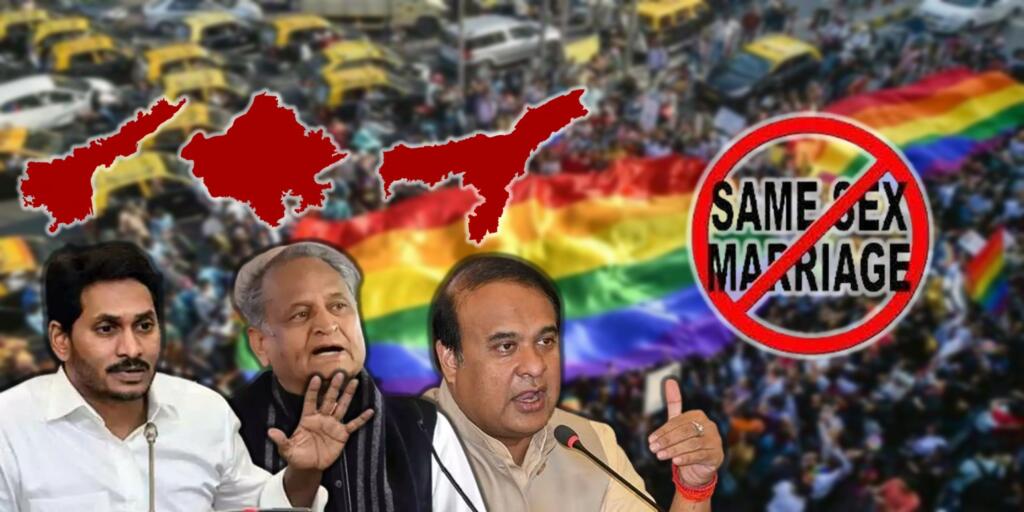Same-sex marriage: In the realm of politics, a valuable lesson can be gleaned: Anticipate the Unforeseen! A remarkable form of solidarity unfolded when three distinct leaders, each governing separate states, found themselves united by a singular cause. Their message, while straightforward, resonated with absolute clarity: Emphatically reject the notion of same-sex marriages!
Aassam, Rajasthan and Andhra unites
After the central govt sought the views of the governments of states and union territories on the matter of same-sex marriage, petitions for which are being heard by the constitution bench of the supreme court, seven of them have submitted their responses. Of the 7 states, Assam, Andhra Pradesh and Rajasthan have opposed legal validation of same-sex marriage, while the other four have sought more time, saying the matter needs very intense and expansive debate.
This was informed by Solicitor General Tushar Mehta at a hearing on the matter by the five-judge constitution bench headed by Chief Justice D Y Chandrachud.
Leading the states unequivocal in their opposition to the same sex marriage, Andhra Pradesh govt has said that it consulted the religious heads of various religions in the State, and all of them opposed the demand for legal recognition of same-sex marriages. The special chief secretary to Andhra Pradesh government said, “After considering the above views, I am to inform that the state of Andhra Pradesh is against the same sex marriage and/or persons belonging to LGBTQIA+ community”.
The Rajasthan government has said that same-sex marriages will create imbalance in the social fabric, leading to far reaching consequences for the social and family system. The state govt said that based on a report by the Department of Social Justice and Empowerment, it is opposed to the petitions seeking recognition of same-sex marriage.
Assam govt made several arguments in its opposition to the demand. In its response, Assam govt said that the recognition of marriage for same-sex couples and the LGBTQIA+ community invokes new interpretations and challenges the validity of existing laws concerning marriage and various personal laws enforced in the state which has diverse cultures, creed, customs and religions.
Also read: Tushar Mehta: Whose Gender Theory shut down the arguments of the pro same sex marriage cabal
The government of Assam said that while the matter calls for wide ranging discussions on the various aspects of the institution of marriage as a social phenomenon, across cross-sections of societies, the legal understanding of marriage has been that of an agreement or a contract between between two persons of opposite genders.
The state govt further argued that legislation is the prerogative of legislature at centre and states, adding that the courts should view matters related to legislation in accordance with the core principles of the country’s democratic structure. “The Legislature reflects the collective wisdom of the nation and its citizens, and it solely possesses the power to enact a law governing human relationships,” the Assam government said. Notably, this was the very ground on which Supreme Court was compelled to leave the matter up to the states.
These states need time
Contrarily, certain states upheld the belief that thorough deliberation with all relevant parties is imperative prior to reaching a conclusive stance. Consequently, in response to the center’s missive requesting viewpoints on the matter, the Uttar Pradesh government expressed its inability to furnish a comprehensive response without conducting extensive consultations encompassing diverse segments of society. It asserted that the government requires an extended duration to carefully formulate its reply, highlighting the constraints imposed by the limited timeframe provided.
Similarly, Maharashtra conveyed akin sentiments, citing the unavailability of complete material, including the pleadings presented by various parties before the apex court, as a hindrance to delivering an all-encompassing response. The state government emphasized the sensitivity of the issue, acknowledging its potential impact on multiple religious groups within the state. Correspondingly, states such as Manipur and Sikkim also requested additional time to establish a suitable committee dedicated to addressing the subject matter.
Also read: No same sex marriage in India
The road ahead
And dear folks take a note, for there is a common thread that unites them all: None of the states harbour intentions to impose their ideologies upon the masses, yet three states have vehemently voiced their opposition to the preposterous notion of same-sex marriage. It is only due to the intervention of Solicitor General Tushar Mehta that the current bench of the Supreme Court narrowly avoided setting the stage for the coercive imposition of such marriages upon the citizens of India.
Therefore, should the states stand united in defiance of this mindset, the Supreme Court will have no choice but to heed their collective demands, as the judiciary cannot surpass its constitutional role and act as a super legislative body, unless Chief Justice Chandrachud himself wishes to witness the demise of the collegium system first-hand.
Support TFI:
Support us to strengthen the ‘Right’ ideology of cultural nationalism by purchasing the best quality garments from TFI-STORE.COM
